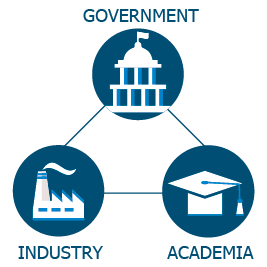May 13, 2019
Finding Jobs in the Government
Posted by AGU Career Center
Useful Resources for Finding Jobs in the Federal Government
 While most geoscientists are employed in academia or industry, there are a significant number employed by the federal government. Employment with the federal government is in-between industry and academia in many ways – salary, benefits, academic freedom, and so on. Many people don’t know what the federal government does, and have no idea what employment opportunities there are. If you’re one of them, below are some resources that can help you explore this employment sector, and see if it’s right for you.
While most geoscientists are employed in academia or industry, there are a significant number employed by the federal government. Employment with the federal government is in-between industry and academia in many ways – salary, benefits, academic freedom, and so on. Many people don’t know what the federal government does, and have no idea what employment opportunities there are. If you’re one of them, below are some resources that can help you explore this employment sector, and see if it’s right for you.
Gogovernment.org
This site is maintained by the Partnership for Public Service, a nonprofit organization with the mission to create a more effective government, and is an excellent place to start researching federal employment. The site includes lots of information on how to find federal jobs, read federal job announcements, overviews of federal agencies, career guides, (including http://gogovernment.org/government_careers/field/physical_sciences.php for physical sciences), and more. This site will help you target your search, learn about job series codes (the four-digit number corresponding to a government job category), get tips on how to apply, and more.
Usajobs.gov
This is the main site for federal government jobs. This is a huge site, with lots of useful content and functions.
- Job Announcements
All federal jobs are posted here (with a few exceptions), with extremely detailed job descriptions (often 5 pages or more). These descriptions include details on the position’s responsibilities, duties, requirements, location, salary, and more. You can customize and save search queries, so results will be emailed to you regularly. Note that an announcement may only be posted for one week, or until a certain number of resumes (such as 100) are received, whichever comes sooner. This means it’s in your best interest to submit your application as soon as the posting appears. - Government Resumes
The federal government is very specific about the information they want you to provide, and you can use this site to create a federal resume in the appropriate format. This would include starting and ending dates (month and year) for each position you’ve held, as well as number of hours worked each week, level and amount of experience, and specific accomplishments and relevant experiences that address each and every requirement in the job announcement. In many cases, they will also want salary data. On this site, you can create and store up to five different versions of your government resume, ready for quick customization and submission as soon as an appropriate opening is posted. - Publicize
Once you have entered all your information and created a federal resume, you can choose to make it searchable by recruiters. - Application
You can submit your documents and apply for specific positions.
Zintellect.com
This website, sponsored by the Oak Ridge Institute for Science and Education (https://orise.orau.gov), includes internships, fellowships, experiential learning opportunities, academic fellowships and scholarships, and is especially useful for post-doctoral positions. It can be searched by keyword, academic level, field, etc., and you can apply for positions as well.
Unlike usajobs.gov, this database includes opportunities with private sector organizations (contracting agencies). Often, working for a contracting agency is virtually identical to working for the federal government, in terms of salary, benefits, academic freedom, and so on.
Agency web sites
Many agencies post their openings, and other useful information, on their own web sites. Make sure to explore that information before applying.
Current Hiring Practices
Nothing is constant but change, and that applies to the federal government as well. In October 2018, the Office of Personnel Management (OPM) (https://chcoc.gov/content/announcing-government-wide-direct-hire-appointing-authorities) authorized direct hire appointing authorities for a number of STEM positions. Because there is a critical hiring need or severe shortage of candidates, OPM now allows agencies to hire certain STEM professionals without competitive rating and ranking, veterans’ preferences, or “rule of three” procedures (where only the top three scoring candidates were passed along to the hiring manager). This includes some physical scientists (1301), health physics (1306), physics (1310), chemist (1320), and mathematicians (1520). While geophysicist (1313) is not specifically on the list, in many cases you don’t have to have a degree in that specific field, but can instead show proof of specialized experience. This means networking and direct contacts will play an even bigger role in federal hiring in the near future.
Lisa M. Balbes, Ph.D., has been a freelance technical writer and editor at Balbes Consultants LLC for over 25 years. She is the author of Nontraditional Careers for Chemists: New Formulas for Chemistry Careers (Oxford University Press).


 On the Job is an AGU blog, that provides career advice and workforce guidance to geoscience students, early-career and established professionals who are interested in pursuing professional enrichment.
On the Job is an AGU blog, that provides career advice and workforce guidance to geoscience students, early-career and established professionals who are interested in pursuing professional enrichment.